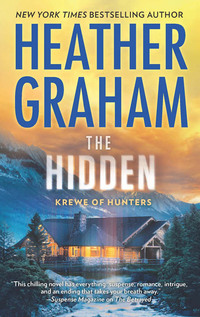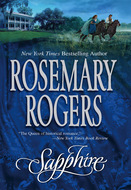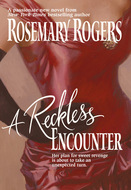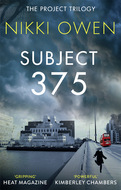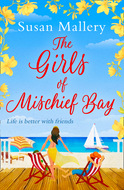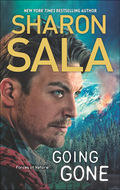Raamatut ei saa failina alla laadida, kuid seda saab lugeda meie rakenduses või veebis.
Loe raamatut: «The Hidden»
Can the same killer strike again—a hundred and fifty years later?
Estes Park, Colorado, is a place of serenity. But it wasn’t always so serene. Shortly after the Civil War, Nathan Kendall and his wife were murdered there, leaving behind a young son. The crime was never solved.
Now…historian Scarlet Barlow is working at a small museum attached to a B and B, the same building where that murder occurred. She recently came to Colorado, reeling after her divorce from FBI agent Diego McCullough. Diego—who’s just been asked to join the Krewe of Hunters, a unit dealing with “unusual” situations…
When Scarlet unwittingly takes pictures of people who’ve been murdered—just like the Kendalls a hundred and fifty years before—the police look at her with suspicion. Then the museum’s statues of historic people, including Nathan Kendall, begin to talk to her, and she knows it’s time to call her ex-husband. Diego heads to Estes Park, determined to solve the bizarre case that threatens Scarlet’s life—and to reunite with the woman he never stopped loving.
Praise for the novels of New York Times bestselling author Heather Graham
“Once again, Heather Graham has outdone herself. The Betrayed took me on a fantastic trip to Sleepy Hollow and I’d travel with Graham anywhere… This chilling novel has everything: suspense, romance, intrigue and an ending that takes your breath away.”
—Suspense Magazine
“The Hexed will take you through an intriguing maze with the right amount of twists and turns to keep you off balance to the surprising ending.”
—Fresh Fiction
“Dark, dangerous and deadly! Graham has the uncanny ability to bring her books to life, using exceptionally vivid details to add depth to all the people and places.”
—RT Book Reviews on Waking the Dead, *Top Pick*
“Murder, intrigue…a fast-paced read. You may never know in advance what harrowing situations Graham will place her characters in, but…rest assured that the end result will be satisfying.”
—Suspense Magazine on Let the Dead Sleep
“Graham deftly weaves elements of mystery, the paranormal and romance into a tight plot that will keep the reader guessing at the true nature of the killer’s evil.”
—Publishers Weekly on The Unseen
“I’ve long admired Heather Graham’s storytelling ability and this book hit the mark. I couldn’t put The Unholy down.”
—Fresh Fiction
“Suspenseful and dark.… The transitions between past and present flow seamlessly, and the main characters are interesting and their connection to one another is believable.”
—RT Book Reviews on The Unseen
The Hidden
Heather Graham
For family and family trips.
Road trips!
Dennis, Jason, Shayne, Derek, D.J., Bryee-Annon and Chynna.
Ghost tours along the way…
And a precious journey through time and American history.
In memory of Shirley Dougherty, Harpers Ferry, West Virginia—one of the most entertaining and informative guides I have ever had the privilege to know.
And to ghost stories…
History isn’t so much a list of dates and times as it is the tales of those who came before us, their failures and their triumphs, and their place in the time that led us to our world today.
Contents
Cover
Back Cover Text
Praise
Title Page
Dedication
Prologue
1
2
3
4
5
6
7
8
9
10
11
12
13
14
15
16
17
18
19
Epilogue
Extract
Copyright
Prologue
The Colorado Territory Fall 1870
Nathan Kendall woke in the middle of the night, aware that something wasn’t right. He tried to tell himself that he was imagining the sudden sense of danger that had roused him from a deep sleep; he had done his best to leave the past behind, to embrace his new life.
And the woman he loved.
She lay at his side, still sleeping peacefully. Jillian Vickers Kendall, whose smile truly seemed to radiate light, whose every movement was silk and grace. The miracle was that she loved him—and that their child slept in a cradle at their side.
Jillian...and their child. Fear swept over him like a tidal wave.
He was instantly alert, afraid to move until he recognized the source of danger.
He wished to hell he’d thought to get himself a good guard dog. But at first there had been no reason to fear anyone, nothing to worry about except an angry bear.
There still shouldn’t have been anything to worry about.
He lay in the darkness, listening. He felt as he had sometimes during the brutal years of the Civil War, as he lay asleep in his tent on the cold earth, where the men slept wherever they had fallen in exhaustion after retreat had been sounded.
He felt as if the enemy might come at any minute, guns blazing and bayonets ready.
All his fears then had been of the enemy, of battle, guns and swords, the sound of horses shrieking, caught in the fire, dying in the mud. The sound of men screaming, the scent of burning flesh that coincided with horrible pain and despair.
But the enemy was no longer the enemy, at least not on paper. And not according to the greatest general the United States—and the Confederacy—had ever nurtured, Robert E. Lee.
When they’d lain down their arms, Lee had urged that they all sue for peace.
It had taken Nathan a few years to truly understand the concept.
His own home had been razed in the fighting. His parents had passed away during the war years. His only brother had been killed at Shiloh.
Peace, General Robert E. Lee had said. They were beaten. No more blood, no more horror. Find peace. But for some, many of them in Nathan’s company, drawn from what had become West Virginia during the middle of the war, the war hadn’t ended. For a while he’d fallen in with them. Brian Gleason’s home at Front Royal had been burned to the ground, Jeff Bay’s wife had died in childbirth while they’d been away fighting and Billie Merton’s father had sided with the North. All had felt they had nothing left but to keep fighting, which meant stealing anything that belonged to the hated Northerners.
He hadn’t thought it such a bad thing to rob banks owned by carpetbaggers. Or even to hold up stagecoaches as they moved westward, filled with more carpetbaggers from the North. He’d had no problem joining up with a few of the other men from his infantry company to become bandits—like Robin Hood, of course, stealing from those who had descended on the broken and bleeding South like a horde of vultures.
But then they had killed someone during a bank robbery.
And Nathan had wanted out. War was one thing—it was horrible and ugly, killing men with different ideals who just wanted to go home as much as he did. But that was kill or be killed.
Cold-blooded murder was another thing, and more than he could bear at this stage of his life.
Peace.
He had found it in the Colorado Territory.
A little bit of money had purchased a nice piece of land from old Rollo Conway, a worn-out prospector who hadn’t done so well, up on a plateau that looked out on the majestic peaks of the Rockies. The ranch still bore his name.
A fellow named Joel Estes had founded Estes Park, the nearby community that bore his name, around 1859, and since then, rich Europeans and inquisitive naturalists had come to marvel at the place, along with prospectors determined to search for riches in the nearby multitude of mountain streams.
Nathan panned for gold himself, but he kept quiet about his discoveries, because he didn’t really want to be a gold miner. He wanted to be a rancher. He wanted simple things. The precious gold bits he’d found were nothing but a means to an end. He wanted a stable and a home, both of which he was more than willing to build by hand. Hard labor, working to erase his painful memories, was his way of finding a new life.
And then he’d met Jillian at the little church just down the mountain. She’d been there with her father, United States Marshal Tom Vickers, and though Vickers hadn’t liked him, Jillian had fallen head over heels in love with Nathan. When Marshal Vickers had left town to do his duty in the surrounding countryside, Jillian had talked Father Ferguson into marrying them. After all, they were both of legal age, so that had been that.
After all those brutal years, he’d found peace.
Peace and that rare, elusive feeling called happiness.
But tonight...
What in God’s name was it? The slight difference in the breeze, the rustle as it moved through leaves just beginning to hint of fall...
The bugles were silent now.
But there was something out there...
He jumped out of bed and grabbed his Colt. It wasn’t as cumbersome as the the Enfield rifle he’d carried during the war. No, it had come from his outlaw days, an army rifle manufactured at the end of the war, and offering precision aim and six bullets that could be fired in quick succession.
He looked at his wife, his precious wife, where she still lay sleeping. And he looked at his child, his son, sleeping just as peacefully.
He walked to the window of their upstairs bedroom and looked out on the world he had forged on the little mountaintop plateau. Storage and stables to his right, smokehouse and bunkhouse to his left. So far, no one was sleeping in the bunkhouse; he was just getting to where he could afford to hire the ranch hands who would fill it.
Great trees stretched high to the heavens in the night sky, visible by the light of a slightly waning moon. He heard a horse neigh and that seemed like another warning.
He wished again that he’d gotten dogs; the cats he kept as ratters in the stables wouldn’t be much of an alarm.
What was spooking him? he wondered.
Indians suddenly creeping back to reclaim the area? No, not now, not here.
The ghost of a dead Yankee soldier he might have killed, back to seek his revenge?
Or a living man? His father-in-law, ready to kill them both for defying his edict not to marry?
Who else?
The outlaws he had ridden with until theft had become murder? Jeff Bay, who had led them all? Jeff had become so filled with hatred that he hadn’t understood Nathan’s anger that he’d shot a man in cold blood simply because the victim had come from the North.
Or were Brian Gleason, Billie Merton and the other outlaws he’d ridden with angry because he had opted out?
He jumped suddenly as his wife slipped her arms around him. He’d been so lost in his thoughts that he hadn’t heard her come up behind him.
“Nathan,” she said softly. “What is it?”
He turned, holding her close, feeling the beat of her heart and the warmth of her body. “I don’t know,” he said. “I thought something was out there.”
“It’s nothing, my love,” she told him. “Come back to bed.”
He nodded and turned back to the window for one last look.
And then he saw it, a shadow slipping from the storage shed next door.
“Stay here,” he told Jillian. “Look after the baby.”
Nathan crept quietly down the stairs. He unbolted the front door as silently as he could, then slid outside, using the wall as cover, straining to see in the darkness.
The shadow was still there by the storage shed. It seemed to be lumbering.
He almost laughed out loud.
A bear.
He stepped out on the porch, thinking to fire a warning shot, so the creature would amble off without doing any harm.
Without warning, he was hit. A blow to the head sent him stumbling forward, tripping over the steps to the porch, and he landed hard in the dirt with his head spinning so wildly that he saw stars in the sky that weren’t there.
He blinked to clear his eyes and realized that he’d been attacked by a monster.
No, not a monster.
A man.
A man in a bizarre mask and hat.
“Coward,” Nathan whispered. “Show yourself.”
And then he knew. He’d never really found peace.
And he was going to die.
1
Colorado, Present Day
A majestic elk stood stock-still on the hill, long neck arched to the sky in the sunset, antlers large and proud. Scattered wildflowers nestled within the long grass, and the colors of the horizon were almost whimsical in their beauty.
Scarlet Barlow kept her distance, though the animal didn’t seem to be the least bit afraid of her. The elk in the area were accustomed to people who came to hike the mountainous country, the crests and valleys and little plateau where the onetime Conway Ranch was now a bed-and-breakfast, complete with a gift shop and museum. No one disturbed the elk that came here to graze the lush meadows, and the elk apparently knew that. The B and B was a mere stone’s throw from the eastern entrance to Rocky Mountain National Park, so those who came to admire the animal life there meant it no harm.
The big bull elk seemed to be aware that he was posing like a model; it was almost as if he was happy to offer her the photo op.
She snapped several pictures, paused and glanced at them on the screen, then smiled, pleased with what she had captured.
“Thank you, sir,” she said to him, then turned away and looked out over the natural splendor of the Rockies and the town of Estes Park, nestled among them.
People came here for many reasons.
One of the biggies was The Stanley Hotel. Stephen King had been staying there when he’d been inspired to write The Shining. The hotel offered both ghost and historical tours, and Scarlet loved it. She liked to imagine what the author had thought and to hear the staff talk about how the events in the book related to what had really happened there.
The Conway Ranch, where she’d been working as a researcher and curator for the past two months, had a history just as unique and intriguing, even if not as well-known. She loved knowing that her contributions to the small on-site museum were helping it to become more and more of an attraction on its own. The ranch had been founded in the 1860s, just a few years after Joel Estes had established the town and a few months after Welsh explorer Griffith Evans had opened a dude ranch in the area. Ranching was no easy matter in this mountainous country seventy-five hundred feet above sea level. And as far as the Conway Ranch went, “ranching” had long meant guided trail rides for the tourists.
Scarlet smiled. She couldn’t get over the awe she always felt as she looked at the towering snowcapped peaks of the Rockies.
She’d been told nothing compared to the Canadian Rockies, but she couldn’t imagine that any scenery could be more beautiful than this.
Even the town felt special to her, with its unique shops and restaurants, everything nestled in a natural paradise of mountain peaks and forests cut through by brooks that were bubbling and bright in the sunlight, cool and mysterious by night. Hikers, horseback riders and tubers and rafters, who took their chances with the rapids, came year-round to enjoy the scenery.
This place was as different from her native South Florida as it could get, but both were natural playgrounds, and this was a perfect place to be. At least for now.
Her apartment was on the top floor of what had once been a storage barn for feed and ranching equipment. Now it housed the museum on the ground floor and her two-bedroom apartment on the second. The museum had actually come about accidentally. The original builder had started out organizing his own Civil War and Native American memorabilia, then added more pieces as he acquired them. Over the years various people had taken a stab at cataloging everything, but finally the current owner had decided it was time for a professional to come in and make sense of it all.
And that was where Scarlet had entered the picture.
She’d been a bookworm all her life, with a particular interest in history. At college she’d majored in history and minored in archaeology, going on to get master’s degrees in both. What she loved most wasn’t the bare bones of dates and places but the stories that went along with events, stories about the people who’d actually lived at the time and whose experiences provided a unique perspective.
After college she had worked in New York for several years before she had been invited to come home to South Florida to work a new dig in the field she considered her specialty, eighteenth and nineteenth century America, at the mouth of the Miami River. She had followed both the lure of the job and her heart, taking the position not only for itself, but also to be closer to the man she’d loved, FBI agent Diego McCullough. And now, thanks to the current owner of the ranch, Ben Kendall, she was here in Colorado.
Ben, a descendant of the original owner, Nathan Kendall, and his wife, Trisha, had purchased the place five years ago. For them, restoring the Conway Ranch was a labor of love. They’d refurbished it with the money he’d made as a New York stockbroker, having given up the city life to return to his family roots.
A history buff from way back, he had tracked down Scarlet in New York City after discovering that she, too, had a family connection to the ranch and to him, and they’d stayed in touch when she went back to Florida, where she’d eventually married Diego. And he’d been right there with a job offer after the divorce, when she’d wanted and needed to get away.
“Scarlet! Afternoon!” Ben called out to her now from the wide porch of the main house, breaking into her thoughts.
Given the time, she realized he must have just returned from leading the afternoon trail ride, just as he did six days a week. Angus Fillmore—the quintessential cowboy, with his long white hair and beard, solid shoulders and strong arms—was still leading horses into the stables. One of the guests, Terry Ballantree, thirtyish and another descendant of Nathan Kendall, was talking animatedly to Angus, who was nodding politely but didn’t seem to be saying much. Gwen and Charles Barton, newlyweds from Mississippi, were waiting for their chance to say something to Angus, but Terry seemed to be nothing if not long-winded.
“Scarlet, I’m glad to run into you,” Ben told her, just as the head housekeeper, Linda Reagan, tall, slim and very pretty, stepped out on the porch behind him.
“Don’t forget to wipe your boots off before you come inside,” Linda said, then waved to Scarlet.
“I will, I will!” Ben promised, then joined Scarlet on the wide front lawn.
She smiled, wondering how he had ever been a stockbroker. He was fifty-five and blessed with a full head of snow-white hair that he liked to keep long. He always had a smile on his face now, which he hadn’t had when she’d first met him. The stress of working on Wall Street had kept him looking harried and worn, but now he was a happy man. He’d told her once that he was certain he’d really been made for the great outdoors.
“You’re welcome on the ride anytime,” he told her. “I know you love the horses.”
“Believe it or not, Ben, I grew up around horses.”
“South Florida? That’s beach country.”
“There are lots of horses all over the state,” she said. “I grew up in Davie. We had horses there, and my folks still do.”
“Well, I’ll be damned,” he said. “So how’s it going? Are you liking the job?”
“I love it here,” she assured him. “Your collection is amazing. Colts from just about every era from the 1850s onward, Spencer repeating rifles, Smith & Wesson revolvers, Winchesters, you name it. Worth a fortune, if you wanted to sell.”
He shook his head. “My selling days are over. I’m looking forward to spending every day here, sharing all this with our guests, for the rest of my life.”
“You’re a happy man,” she said.
He grinned. “Best wife in the world and this little piece of heaven. How can I not be happy? Looks like you appreciate the place, too.” He nodded toward her camera.
“I just got a terrific picture of an elk. Big guy with a huge set of antlers.”
“Can’t bring yourself to say ‘big rack,’ huh?” he teased.
She laughed. “Honestly, it never occurred to me. One thing we don’t have in Florida are elk. Especially not elk that like to pose for you.”
“Let me see,” Ben said.
She produced her camera and hit the little button to show her stored photos.
Ben took the camera from her with a grin on his face, but his grin froze as he stared at the screen and then at her. “Where the hell were you? What is this?” he demanded, handing the camera back to her.
Startled, Scarlet took the camera and stared at the screen. There was no bull elk with majestic antlers. It was the same spot, but the picture was of a man. A man hanging from a branch of a mighty oak, blood dripping from his body to the ground.
She stared at it, stunned.
“I—I didn’t take this!” she said.
She hit the button to switch to the next picture. That one showed two people, the same man and a woman, on the ground, tangled together in a pool of blood.
She flicked backward and saw a picture of the woman while she was still alive, though just barely. A large red stain covered her midriff, her arms were thrown back and her mouth was open in an O of agony and shock. It looked as if a bullet had just ripped through her body.
Dead people. Her pictures were of dead people.
She flicked back to the shot of the couple. It was hard to tell exactly which limbs belonged to which person as they embraced in a pool of blood.
“Honestly, Scarlet, what the hell?”
“I—I don’t know,” she said. “I didn’t take these. I never saw any of this. I—I was right over there,” she said, pointing.
He looked at her for a moment as if she was severely disturbed. Scarlet looked back at the camera, flicking through the many shots she had taken in search of the elk.
It wasn’t there anywhere.
Just the man and the woman...
Perhaps her stunned expression had an effect on Ben, who asked, “Can a camera be hacked?”
“I don’t think so,” she said. “But I just don’t get it. I didn’t see anything like that, and I never would have taken pictures of it if I had.” She shook her head and handed the camera back to Ben, as if she couldn’t bear to touch it.
Ben studied the camera and scrolled through the shots, then stared at her, frowning. “What did you do that for?”
“Do what?”
“Erase them all.”
“I didn’t erase anything!”
“Well, they’re gone. I admit your elk is fantastic, but why on earth would you fake pictures of corpses on my property?” Ben said.
She stared at him, angry now, and totally confused. How could those vile shots have disappeared and the elk have reappeared in their place? “Really, Ben? You think I could do something like that? Because I didn’t take those pictures, and I didn’t erase them, either. I don’t know how they got there, but I had nothing to do with it.”
“I’m sorry, Scarlet. But they were there, and it was a real shock to see them.”
He stared at her, puzzled, but she thought he believed her.
“We should just take your camera in to Marty Decker. He runs a great camera shop in town. I’m sure he can figure out what’s going on. You know, even if it’s just a camera, I think anything and everything can be hacked these days. I wouldn’t even have a computer if we didn’t need the damned thing for the business. Leave it with me. I’ll get it to him, and I’ll make sure he saves your pictures of the elk. They’re really beautiful.”
“Thanks, Ben,” she told him. “I use computers and cameras all the time while I’m working, but I’ve never seen anything like this.”
Ben shrugged, then asked, “You going to join us for dinner?”
She was still offended that he could even think she would do something like that, but on the other hand, she couldn’t really blame him. She forced a smile. “No, I’ve got some paperwork to finish, but thank you for the invitation. You’re sure you don’t mind taking the camera to your friend?”
“Not at all.”
“Okay, thanks.” She gave him a little wave and walked away. Terry Ballantree and the Bartons crossed her path, so she paused to say hello, even though she longed to get away and try to sort out what had happened.
“Scarlet, thanks so much for the tour yesterday,” Terry said. “Any way I can get another look before dinner? I’d love another look at some of those old photos.”
“We loved it, too,” Gwen said.
“I’m glad you enjoyed yourselves,” Scarlet said. “Ben is kind of strict about the museum. It’s only open Thursday to Sunday, and this is Monday, but if you’re all here for a few more days, I’ll ask him if I can take you back through for a private tour tomorrow or Wednesday.”
“Thanks,” Terry said.
“That would be great,” Gwen said. She and Charles were both in their twenties, and they almost looked like children playing at marriage, but Scarlet had found them both to be open and friendly. Charles had been a football player at Ole Miss, and Gwen had been a cheerleader. Now he had just started his own law practice. Gwen was blonde and blue-eyed, a perfect contrast to his tall, dark and handsome.
Terry was a nice guy, too, though his never-ending enthusiasm was a bit exhausting. He was good-looking, with sandy-brown hair and large hazel eyes, a generous mouth and a perfect nose. While he was only medium height, he was in good shape.
But with her nerves completely frayed right now, she just wasn’t up to dealing with any of them.
“I’ll talk to Ben and let you know,” Scarlet said, then quickly made her escape. “See you all later,” she called over her shoulder.
The old storage barn had been given windows sometime at the end of the Victorian era, and though plain shades were drawn over the museum windows, those upstairs boasted pretty drapes.
Scarlet unlocked the door and stepped inside. The security lights, added to the last of the daylight seeping in, created an eerie glow, but it didn’t bother her in the least. She was in love with the place. Many of the displays were the originals, over a hundred years old, as were the placards they held, written in cursive by a gentle hand almost a hundred and fifty years ago.
There were life-size figures on pedestals arranged throughout the room, ranging from Ute chiefs in full battle regalia to Yankee and Rebel soldiers, fur trappers, gunslingers and frontier women, along with excellent re-creations of real people like Teddy Roosevelt and John Muir. There were twenty-two of them altogether, the oldest nearly as old as the ranch itself. Her favorite was a Ute woman holding a child and looking skyward. There was something so beautiful in her expression that Scarlet was certain she had been modeled from life by an artist who adored her.
The stairs to her apartment were to the far left. A sign hanging from a velvet rope advised No Admittance. She unhooked the rope and walked upstairs.
The whole second floor was hers. She had a kitchen, dining room, living room, bedroom and even a guest room. It wasn’t fancy, but to be honest, she preferred it to the main house, which had been fully renovated to offer the rustic, frontier look guests expected.
In the main house, the parlor was spacious, and boasted Victorian furniture, period portraits and paintings, and a number of mounted animal heads, all of them at least a hundred years’ old. The dining room offered more massive heads, including a giant moose head that stared down at the large central table, which seated twelve.
The animal heads actually made Scarlet a little sad, but Trisha had told her that they were part of the tradition of the West and the guests expected them. Even so, Scarlet had never quite gotten used to them, and she had actually declined several meals at the main house because she felt so uncomfortable eating with the dead moose looking down at her.
Her place, however, was, in her opinion, just as nice as the main house, not to mention it was her own.
And neither her apartment nor the museum had trophy heads anywhere on the walls.
The apartment had been recently remodeled and refurbished. The master bedroom held two antique dressers, a washstand with a pitcher and bowl and an antique bed frame that held a very modern and comfortable queen-size mattress.
Scarlet loved her job here and was enjoying the emphasis on the Civil War, Reconstruction and westward expansion. It was so different from her work in Florida, which had focused on the Seminole Wars.
She walked into the kitchen and decided to brew tea while debating whether to go into town for dinner. She hadn’t actually left the property in a few days, so getting out and about was probably a good thing to do. She could become reclusive all too easily, she knew.
She was mulling over the strange pictures on the camera and pouring hot water over a tea bag when she heard a thump.
It was a loud thump. Loud enough to make her nearly spill scalding water over her hand.
She quickly set down the kettle and frowned. The sound had come from downstairs, where there shouldn’t have been anyone. She was certain she’d locked the door behind her.
Unease filled her. There wasn’t even a door between her and the downstairs, something she’d never thought about before.
She dug in her pocket quickly for her cell phone. After the camera incident, she didn’t want to sound like a paranoid idiot, but she didn’t want to take any chances, either.
She dialed the main house. “Hey,” she said when Ben picked up, “I’m just checking. Is anyone supposed to be downstairs in the museum? I just heard...something down there.”

